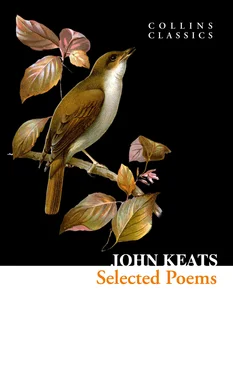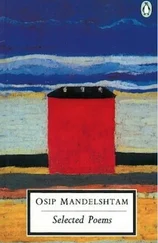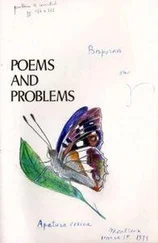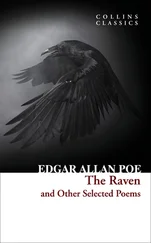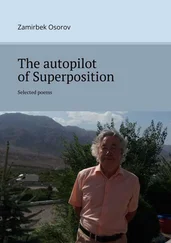Who stood on Latmus’ top, what time there blew
Soft breezes from the myrtle vale below;
And brought in faintness solemn, sweet, and slow
A hymn from Dian’s temple; while upswelling,
The incense went to her own starry dwelling.
But though her face was clear as infant’s eyes,
Though she stood smiling o’er the sacrifice,
The Poet wept at her so piteous fate,
Wept that such beauty should be desolate:
So in fine wrath some golden sounds he won,
And gave meek Cynthia her Endymion.
Queen of the wide air; thou most lovely queen
Of all the brightness that mine eyes have seen!
As thou exceedest all things in thy shine,
So every tale, does this sweet tale of thine.
O for three words of honey, that I might
Tell but one wonder of thy bridal night!
Where distant ships do seem to show their keels,
Phoebus awhile delayed his mighty wheels,
And turned to smile upon thy bashful eyes,
Ere he his unseen pomp would solemnize.
The evening weather was so bright, and clear,
That men of health were of unusual cheer;
Stepping like Homer at the trumpet’s call,
Or young Apollo on the pedestal:
And lovely women were as fair and warm,
As Venus looking sideways in alarm.
The breezes were ethereal, and pure,
And crept through half closed lattices to cure
The languid sick; it cool’d their fever’d sleep,
And soothed them into slumbers full and deep.
Soon they awoke clear eyed: nor burnt with thirsting,
Nor with hot fingers, nor with temples bursting:
And springing up, they met the wond’ring sight
Of their dear friends, nigh foolish with delight;
Who feel their arms, and breasts, and kiss and stare,
And on their placid foreheads part the hair.
Young men, and maidens at each other gaz’d
With hands held back, and motionless, amaz’d
To see the brightness in each others’ eyes;
And so they stood, fill’d with a sweet surprise,
Until their tongues were loos’d in poesy.
Therefore no lover did of anguish die:
But the soft numbers, in that moment spoken,
Made silken ties, that never may be broken.
Cynthia! I cannot tell the greater blisses,
That follow’d thine, and thy dear shepherd’s kisses:
Was there a Poet born? – but now no more,
My wand’ring spirit must no further soar. –
Now Morning from her orient chamber came,
And her first footsteps touch’d a verdant hill;
Crowning its lawny crest with amber flame,
Silv’ring the untainted gushes of its rill;
Which, pure from mossy beds, did down distill,
And after parting beds of simple flowers,
By many streams a little lake did fill,
Which round its marge reflected woven bowers,
And, in its middle space, a sky that never lowers.
There the king-fisher saw his plumage bright
Vieing with fish of brilliant dye below;
Whose silken fins, and golden scales’ light
Cast upward, through the waves, a ruby glow:
There saw the swan his neck of arched snow,
And oar’d himself along with majesty;
Sparkled his jetty eyes; his feet did show
Beneath the waves like Afric’s ebony,
And on his back a fay reclined voluptuously.
Ah! could I tell the wonders of an isle
That in that fairest lake had placed been,
I could e’en Dido of her grief beguile;
Or rob from aged Lear his bitter teen:
For sure so fair a place was never seen,
Of all that ever charm’d romantic eye:
It seem’d an emerald in the silver sheen
Of the bright waters; or as when on high,
Through clouds of fleecy white, laughs the coerulean sky.
And all around it dipp’d luxuriously
Slopings of verdure through the glossy tide,
Which, as it were in gentle amity,
Rippled delighted up the flowery side;
As if to glean the ruddy tears, it tried,
Which fell profusely from the rose-tree stem!
Haply it was the workings of its pride,
In strife to throw upon the shore a gem
Outvieing all the buds in Flora’s diadem.
I.
Woman! when I behold thee flippant, vain,
Inconstant, childish, proud, and full of fancies;
Without that modest softening that enhances
The downcast eye, repentant of the pain
That its mild light creates to heal again:
E’en then, elate, my spirit leaps, and prances,
E’en then my soul with exultation dances
For that to love, so long, I’ve dormant lain:
But when I see thee meek, and kind, and tender,
Heavens! how desperately do I adore
Thy winning graces; – to be thy defender
I hotly burn – to be a Calidore –
A very Red Cross Knight – a stout Leander –
Might I be loved by thee like these of yore.
II.
Light feet, dark violet eyes, and parted hair;
Soft dimpled hands, white neck, and creamy breast,
Are things on which the dazzled senses rest
Till the fond, fixed eyes, forget they stare.
From such fine pictures, heavens! I cannot dare
To turn my admiration, though unpossess’d
They be of what is worthy, – though not drest
In lovely modesty, and virtues rare.
Yet these I leave as thoughtless as a lark;
These lures I straight forget, – e’en ere I dine,
Or thrice my palate moisten: but when I mark
Such charms with mild intelligences shine,
My ear is open like a greedy shark,
To catch the tunings of a voice divine.
III.
Ah! who can e’er forget so fair a being?
Who can forget her half retiring sweets?
God! she is like a milk-white lamb that bleats
For man’s protection. Surely the All-seeing,
Who joys to see us with his gifts agreeing,
Will never give him pinions, who intreats
Such innocence to ruin, – who vilely cheats
A dove-like bosom. In truth there is no freeing
One’s thoughts from such a beauty; when I hear
A lay that once I saw her hand awake,
Her form seems floating palpable, and near;
Had I e’er seen her from an arbour take
A dewy flower, oft would that hand appear,
And o’er my eyes the trembling moisture shake.
Isabella; or, The Pot Of Basil
A Story from Boccaccio
I.
Fair Isabel, poor simple Isabel!
Lorenzo, a young palmer in Love’s eye!
They could not in the self-same mansion dwell
Without some stir of heart, some malady;
They could not sit at meals but feel how well
It soothed each to be the other by;
They could not, sure, beneath the same roof sleep
But to each other dream, and nightly weep.
II.
With every morn their love grew tenderer,
With every eve deeper and tenderer still;
He might not in house, field, or garden stir,
But her full shape would all his seeing fill;
And his continual voice was pleasanter
To her, than noise of trees or hidden rill;
Her lute-string gave an echo of his name,
She spoilt her half-done broidery with the same.
III.
He knew whose gentle hand was at the latch,
Before the door had given her to his eyes;
And from her chamber-window he would catch
Her beauty farther than the falcon spies;
And constant as her vespers would he watch,
Because her face was turn’d to the same skies;
And with sick longing all the night outwear,
To hear her morning-step upon the stair.
IV.
A whole long month of May in this sad plight
Made their cheeks paler by the break of June:
“To-morrow will I bow to my delight,
Читать дальше
